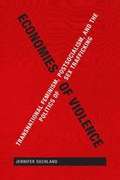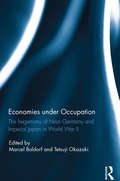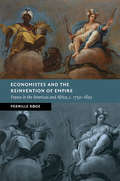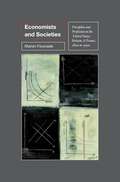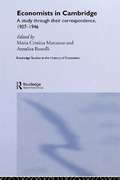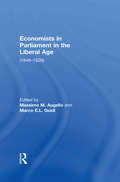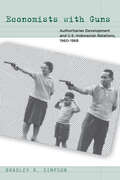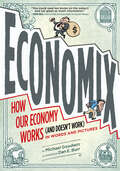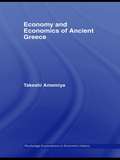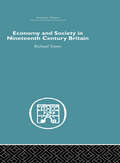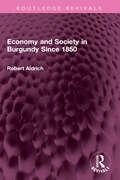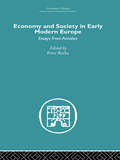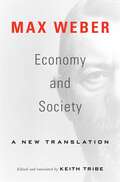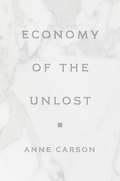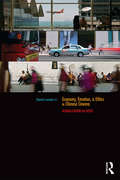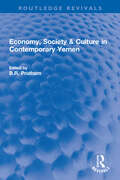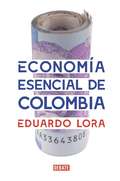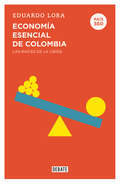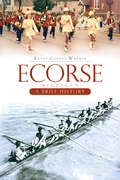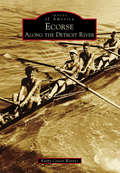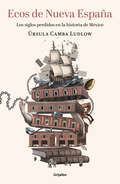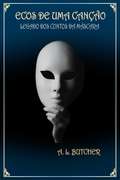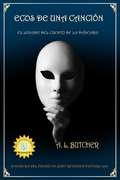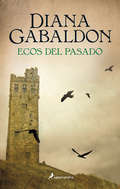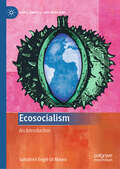- Table View
- List View
Economies of Violence: Transnational Feminism, Postsocialism, and the Politics of Sex Trafficking
by Jennifer SuchlandRecent human rights campaigns against sex trafficking have focused on individual victims, treating trafficking as a criminal aberration in an otherwise just economic order. In Economies of Violence Jennifer Suchland directly critiques these explanations and approaches, as they obscure the reality that trafficking is symptomatic of complex economic and social dynamics and the economies of violence that sustain them. Examining United Nations proceedings on women's rights issues, government and NGO anti-trafficking policies, and campaigns by feminist activists, Suchland contends that trafficking must be understood not solely as a criminal, gendered, and sexualized phenomenon, but as operating within global systems of precarious labor, neoliberalism, and the transition from socialist to capitalist economies in the former Soviet Union and Eastern Bloc. In shifting the focus away from individual victims, and by underscoring trafficking's economic and social causes, Suchland provides a foundation for building more robust methods for combatting human trafficking.
Economies under Occupation: The hegemony of Nazi Germany and Imperial Japan in World War II
by Marcel Boldorf Tetsuji OkazakiNazi Germany and Japan occupied huge areas at least for some period during World War II, and those territories became integral parts of their war economies. The book focuses on the policies of World War II aggressors in occupied countries. The unbalanced economic and financial relations were defined by administrative control, the implementation of institutions and a variety of military exploitation strategies. Plundering, looting and requisitions were frequent aggressive acts, but beyond these interventions by force, specific institutions were created to gain control over the occupied economies as a whole. An appropriate institutional setting was also crucial to give incentives to the companies in the occupied countries to produce munitions for the aggressors. The book explains the main fields of war exploitation (organisation and control, war financing and workforce recruitment). It substantiates these aspects in case studies of occupied countries and gives examples of the business policy of multinational companies under war conditions. The book also provides an account of differences and similarities of the two occupation systems. Economies under Occupation will interest researchers specialising in the history of economic thought as well as in economic theory and philosophy. It will also engage readers concerned with regional European and Japanese studies and imperial histories.
Economistes and the Reinvention of Empire: France in the Americas and Africa, c.1750–1802 (New Studies in European History)
by Pernille RøgeExploring the myriad efforts to strengthen colonial empire that unfolded in response to France's imperial crisis in the second half of the eighteenth century, Pernille Røge examines how political economists, colonial administrators, planters, and entrepreneurs shaped the recalibration of empire in the Americas and in Africa alongside the intensification of the French Caribbean plantation complex. Emphasising the intellectual contributions of the Economistes (also known as the Physiocrats) to formulate a new colonial doctrine, the book highlights the advent of an imperial discourse of commercial liberalisation, free labour, agricultural development, and civilisation. With her careful documentation of the reciprocal impacts of economic ideas, colonial policy and practices, Røge also details key connections between Ancien Régime colonial innovation and the French Revolution's republican imperial agenda. The result is a novel perspective on the struggles to reinvent colonial empire in the final decades of the Ancien Régime and its influences on the French Revolution and beyond.
Economists and Societies: Discipline and Profession in the United States, Britain, and France, 1890s to 1990s (Princeton Studies in Cultural Sociology #38)
by Marion FourcadeEconomists and Societies is the first book to systematically compare the profession of economics in the United States, Britain, and France, and to explain why economics, far from being a uniform science, differs in important ways among these three countries. Drawing on in-depth interviews with economists, institutional analysis, and a wealth of scholarly evidence, Marion Fourcade traces the history of economics in each country from the late nineteenth century to the present, demonstrating how each political, cultural, and institutional context gave rise to a distinct professional and disciplinary configuration. She argues that because the substance of political life varied from country to country, people's experience and understanding of the economy, and their political and intellectual battles over it, crystallized in different ways--through scientific and mercantile professionalism in the United States, public-minded elitism in Britain, and statist divisions in France. Fourcade moves past old debates about the relationship between culture and institutions in the production of expert knowledge to show that scientific and practical claims over the economy in these three societies arose from different elites with different intellectual orientations, institutional entanglements, and social purposes. Much more than a history of the economics profession, Economists and Societies is a revealing exploration of American, French, and British society and culture as seen through the lens of their respective economic institutions and the distinctive character of their economic experts.
Economists in Cambridge: A Study through their Correspondence, 1907-1946 (Routledge Studies in the History of Economics #Vol. 74)
by Maria Cristina Marcuzzo Annalisa RosselliThe University of Cambridge has produced more Nobel Prize-winning economists than the whole of France. This impressive book collects together largely unpublished correspondence from some of the twentieth century's key figures including Keynes, Robinson, Hayek and Sraffa.
Economists in Parliament in the Liberal Age: (1848–1920)
by Marco E.L. GuidiThis detailed volume explores the role and actions of economists in US, Japanese and various European parliaments in the critical period between 1848 and 1920. Featuring chapters written by an international array of contributors from both economics and history, the book provides fascinating insights into the parliamentary life in the period. It highlights the often pivotal role of economists within each administration; examines their influence on policy making, their relationships with other MPs, civil servants, external economic associations and looks at the influence of public opinion on economic policy. The book also discusses the nature of the economic discourse practised in the parliamentary arena, considering the complex relationships between science and practice, and between politics and political economy in light of the evolution of economics during this period. The book is the first of its kind to provide a comparative framework for analysis, and will appeal to economists and historians alike.
Economists with Guns: Authoritarian Development and U.S.-Indonesian Relations, 1960-1968
by Bradley SimpsonOffering the first comprehensive history of U.S relations with Indonesia during the 1960s, Economists with Guns explores one of the central dynamics of international politics during the Cold War: the emergence and U.S. embrace of authoritarian regimes pledged to programs of military-led development. Drawing on newly declassified archival material, Simpson examines how Americans and Indonesians imagined the country's development in the 1950s and why they abandoned their democratic hopes in the 1960s in favor of Suharto's military regime. Far from viewing development as a path to democracy, this book highlights the evolving commitment of Americans and Indonesians to authoritarianism in the 1960s on.
Economix: How and Why Our Economy Works (and Doesn't Work), in Words and Pictures
by Michael GoodwinNew York Times–Bestseller: An “engrossing” history of economics, from an author with “excellent storytelling skills” and an Eisner Award-winning artist (Boing Boing).Stimulus plans: good or bad? Free markets: How free are they? Jobs: Can we afford them? Capitalism, socialism, and communism: What’s the difference? Corporations: Are they people?For those who want to better understand what Wall Street and Washington know (or say they know), this graphic history, with clear, witty writing and quirky, entertaining art, transforms “the dismal science” of economics into a fun, fact-filled story about human nature and our attempts to make the most of what we’ve got.“Quite accessible . . . Goodwin brilliantly contextualizes economic theories with historical narrative, while Burr’s simple but elegant illustration employs classical techniques like caricaturing politicians and symbolizing big businesses (as a gleeful factory) to help the reader visualize difficult concepts.” —Publishers Weekly (starred review)“You could read ten books on the subject and not glean as much education.” —David Bach, #1 New York Times–bestselling author of The Automatic Millionaire“I just cannot stress enough how amazing this book is!”—Wired
Economy and Economics of Ancient Greece (Routledge Explorations In Economic History Ser.)
by Takeshi AmemiyaAddressing the dearth of literature that has been written on this key aspect of economic history, Takeshi Amemiya, a well known leading economist based at Stanford University, analyzes the two diametrically opposed views about the exact nature of the ancient Greek economy, putting together a broad and comprehensive survey that is unprecedented in t
Economy and Society in 19th Century Britain
by Richard TamesFirst Published in 2005. Routledge is an imprint of Taylor & Francis, an informa company.
Economy and Society in Burgundy Since 1850 (Routledge Revivals)
by Robert AldrichFirst Published in 1984 Economy and Society in Burgundy Since 1850 provides a comprehensive overview of the modern history of Burgundy. Burgundy is best known for its wine and its capital of Dijon is most often associated with mustard. Yet the region’s modern history is more than a history of gastronomy. The coming of the railways in the 1850s greatly changed the economic life of the area, spurring the growth of Dijon and contributing to rural depopulation. Agricultural crises throughout the nineteenth century, such as phylloxera epidemic in the vineyards, caused further dislocation in rural life. Even in the twentieth century, the countryside remained agricultural while the city of Dijon owes its dynamism to the expansion of the service sector rather than to heavy industry. This book argues that this evolution -modernisation without industrialization- is not a matter of economic retardation but of the suitability of the region’s natural resources and the intentional choice of its population. Rich in archival sources this book is an interesting read for scholars and researchers of French history, European history, and modern history.
Economy and Society in Early Modern Europe: Essays from Annales
by Peter BurkeIn 1929 two French historians, Lucien Febvre and Marc Bloch, founded Annales, a historical journal which rapidly became one of the most influential in the world. They believed that economic history, social history and the history of ideas were as important as political history, and that historians should not be narrow specialists but should learn from their colleagues in the social sciences. Two of the most distinguished French members of the Annales school are represented in this volume - Fernand Braudel and Emmanuel Le Roy Ladurie - the core of which is the debate on the Price Revolution of the sixteenth century dealt with by Cipolla, Chabert, Hoszowski and Verlinden. Within the volume, all the contributions are oriented towards Europe in the sixteenth and seventeenth centuries, and all are concerned with long-term changes, and with the relation between economic growth and social change. It includes articles on the European movement of expansion discussed by Malowist and the activities of the Hungarian nobles as entrepreneurs discussed by Pach, and two articles on wider issues: Le Roy Ladurie on the history of climate, and Braudel, summing up the Annales programme, on the relation between history and the social sciences. This classic text was first published in 1972.
Economy and Society: A New Translation (People, Markets, Goods: Economies And Societies In History Ser. #Volume 10)
by Max WeberKeith Tribe’s new translation presents Economy and Society as it stood when Max Weber died. One of the world’s leading experts on Weber’s thought, Tribe has produced a clear and faithful translation that will become the definitive English edition of one of the few indisputably great intellectual works of the past 150 years.
Economy of the Unlost: (Reading Simonides of Keos with Paul Celan) (Martin Classical Lectures #14)
by Anne CarsonThe ancient Greek lyric poet Simonides of Keos was the first poet in the Western tradition to take money for poetic composition. From this starting point, Anne Carson launches an exploration, poetic in its own right, of the idea of poetic economy. She offers a reading of certain of Simonides' texts and aligns these with writings of the modern Romanian poet Paul Celan, a Jew and survivor of the Holocaust, whose "economies" of language are notorious. Asking such questions as, What is lost when words are wasted? and Who profits when words are saved? Carson reveals the two poets' striking commonalities. In Carson's view Simonides and Celan share a similar mentality or disposition toward the world, language and the work of the poet. Economy of the Unlost begins by showing how each of the two poets stands in a state of alienation between two worlds. In Simonides' case, the gift economy of fifth-century b.c. Greece was giving way to one based on money and commodities, while Celan's life spanned pre- and post-Holocaust worlds, and he himself, writing in German, became estranged from his native language. Carson goes on to consider various aspects of the two poets' techniques for coming to grips with the invisible through the visible world. A focus on the genre of the epitaph grants insights into the kinds of exchange the poets envision between the living and the dead. Assessing the impact on Simonidean composition of the material fact of inscription on stone, Carson suggests that a need for brevity influenced the exactitude and clarity of Simonides' style, and proposes a comparison with Celan's interest in the "negative design" of printmaking: both poets, though in different ways, employ a kind of negative image making, cutting away all that is superfluous. This book's juxtaposition of the two poets illuminates their differences--Simonides' fundamental faith in the power of the word, Celan's ultimate despair--as well as their similarities; it provides fertile ground for the virtuosic interplay of Carson's scholarship and her poetic sensibility.
Economy, Emotion, and Ethics in Chinese Cinema: Globalization on Speed (Routledge Contemporary China Series)
by David Leiwei LiThe First and Second Comings of capitalism are conceptual shorthands used to capture the radical changes in global geopolitics from the Opium War to the end of the Cold War and beyond. Centring the role of capitalism in the Chinese everyday, the framework can be employed to comprehend contemporary Chinese culture in general and, as in this study, Chinese cinema in particular. This book investigates major Chinese-language films from mainland China, Taiwan, and Hong Kong in order to unpack a hyper-compressed capitalist modernity with distinctive Chinese characteristics. As a dialogue between the film genre as a mediation of microscopic social life, and the narrative of economic development as a macroscopic political abstraction, it engages the two otherwise remotely related worlds, illustrating how the State and the Subject are reconstituted cinematically in late capitalism. A deeply cultural, determinedly historical, and deliberately interdisciplinary study, it approaches "culture" anthropologically, as a way of life emanating from the everyday, and aesthetically, as imaginative forms and creative expressions. Economy, Emotion, and Ethics in Chinese Cinema will appeal to students and scholars of Chinese cinema, cultural studies, Asian studies, and interdisciplinary studies of politics and culture.
Economy, Society & Culture in Contemporary Yemen (Routledge Revivals)
by B. R. PridhamFirst published in 1985, Economy, Society & Culture in Contemporary Yemen was written to present a wealth of research and thinking that was new to the field at the time of original publication. The book covers a wide range of topics, including socio-economic development, agriculture, land use, fiscal policies, emigration, health, education, and politics. In doing so, it provides a close analysis of the situation in Yemen in the 1980s whilst exploring recent developments of the preceding years. It will appeal to those with an interest in the history of Yemen.
Economía esencial de Colombia
by Eduardo LoraEl libro que te ayudará a comprender el funcionamiento de la economía en Colombia de una forma didáctica y sencilla. ¿Sabe quién tiene el poder económico y cómo dispone de él? ¿Le gustaría entender por qué hay tanta desigualdad en Colombia? ¿Le han hablado de las implicaciones económicas y sociales del machismo? ¿Conseguirá usted una pensión? ¿Cree que está pagando demasiados impuestos? Economía esencial de Colombia le ayudará a responder muchas preguntas como estas, con un lenguaje directo y cifras sencillas; es un libro de economía que reúne lo esencial, lo que todos deberíamos saber, escrito sin términos técnicos ni matemáticas y que permite a cualquier lector construir su propia interpretación del pasado, el presente y el futuro del país. Eduardo Lora es uno de los economistas más notables de su generación. Ha dedicado su vida al estudio de los fenómenos económicos y sociales en entidades como Fedesarrollo, el Banco Interamericano de Desarrollo (BID) y la Universidad de Harvard. Este es su primer libro de divulgación.
Economía esencial de Colombia (País 360)
by Eduardo LoraLa economía colombiana no es materia exclusiva de especialistas o iniciados. De forma clara y elocuente, este libro explica los asuntos que más nos afectan: salarios, pensiones, salud, educación, impuestos, medioambiente, tasas de interés, inflación, mercado laboral (con un revelador enfoque de género), crecimiento, desplazados, inmigración, y lo hace a la luz de los efectos de la pandemia y de la crisis social. Temas familiares en mayor o menor medida para todos, pues son parte de la vida diaria, que es donde se encuentran tanto las raíces del descontento como los nuevos futuros para los jóvenes. En la actualización que presentamos, Eduardo Lora hace una contribución única a la divulgación del conocimiento sobre la realidad colombiana y al debate nacional sobre las políticas públicas que necesita el país.
Ecorse Michigan: A Brief History
by Kathy Covert WarnesEcorse, the oldest downriver community, was the site of many critical battles from the French and Indian War through the War of 1812 as French and English settlers forged new homes in the Michigan wilderness. By 1827, the scattering of settlers had developed into a small community, and the township of Ecorse was formed. During the Prohibition era, the peaceful riverfront was transformed into hideouts for rumrunners and other nefarious lawbreakers. From a prosperous shipbuilding industry to a championship rowing club and the Detroit River runs made by the Bob-Lo boats, Ecorse's maritime history is one that continues to engage residents and impel the community forward.
Ecorse: Along the Detroit River
by Kathy Covert WarnesFrench explorers called the Ecorse River the "river of bark," or Ecorces, because the Huron Indians who lived in the villages surrounding it wrapped their dead in the bark of the birch trees that grew along its banks. White pioneers settled on French ribbon farms along the Detroit River, and a small village called Grandport sprang up where the Ecorse River met the Detroit River. By 1836, Grandport, now known as Ecorse, had grown into a fishing and farming center, and, by the 1900s Ecorse had gained fame as a haven for bootleggers during Prohibition, an important shipbuilding center, and the home of several championship rowing teams.
Ecos de Nueva España: Los siglos perdidos en la historia de México
by Úrsula Camba LudlowCasi 300 años de historia se asoman en este original y divertido libro ilustrado que recupera los viajes, lugares, oficios, costumbres y personajes que configuraron el asombroso universo novohispano. Nueva España era un territorio gigantesco, comprendía de lo que ahora es el sur de Estados Unidos hasta Nicaragua. Millones de kilómetros cuadrados. Una vastísima región en la que convivían, no siempre armoniosamente, indígenas, negros, mulatos, mestizos, asiáticos, españoles y uno que otro flamenco, portugués e inglés. Eran piratas, monjas, caciques, virreinas, esclavos y burócratas los que andaban por calles, plazas, y sorteaban los peligros de trasladarse entre pueblos, ciudades y océanos… Contrario a las aburridas lecciones escolares sobre la época virreinal, lejos de los héroes y villanos de monografía, estas páginas nos recuerdan que, entre la llegada de Cortés y la Independencia proclamada por Miguel Hidalgo, existió un mundo complejo y contrastante que apenas se mantuvo en precario equilibrio. Escrito por la reconocida historiadora y escritora, Úrsula Camba Ludlow, Ecos de Nueva España es una apasionante y colorida travesía por los siglos que moldearon nuestro tiempo.
Ecos de Uma Canção (Um Legado dos Contos da Máscara #1)
by A. L. ButcherLegado dos Contos da Máscara Loucura, obsessão e o legado do passado tecem seu feitiço neste conto curto e trágico baseado no Fantasma da Ópera. Uma dúzia de anos tumultuados após os eventos dramáticos na Ópera de Paris, Raoul, o Conde de Chagny, ainda é assombrado pelo misterioso Fantasma da Ópera - a criatura lendária que mantinha os funcionários da Ópera sob seu domínio, sequestrou a amante de Raoul e assassinou seu irmão. Na imaginação perturbada de Raoul, os fantasmas do passado estão por toda parte, e uma música estranha e poderosa ainda o chama em seus sonhos.
Ecos de una canción
by A. L. ButcherLocura, obsesión y el legado del pasado se entrelazan en un maleficio en esta historia breve y trágica, basada en El fantasma de la ópera. Luego de doce años tumultuosos de los hechos dramáticos en la Casa de la Ópera en París, el fantasma de la ópera, la criatura legendaria que esclavizaba al personal de la Casa de la Ópera, secuestró a la amada de Raoul y asesinó a su hermano, aún atormenta al Comte de Chagny. En la imaginación perturbada de Raoul, los fantasmas del pasado están por todas partes; y una música extraña y poderosa todavía suena en sus sueños.
Ecos del pasado (Saga Outlander #Volumen 7)
by Diana GabaldonSéptima entrega de la exitosa saga de Diana Gabaldon "Outlander" en la que se basa la popular serie de televisión. Una historia de amor diferente, en la que los encuentros fortuitos y el juego equívoco del tiempo se conjugan en un intrigante final. Jamie Fraser, antiguo jacobita y rebele a su pesar, tiene claras tres cosas sobre la sublevación de las colonias americanas: que ésta prosperará, que luchar en el lado vencedor no es garantía de supervivencia, y que prefiere la muerte a tener que enfrentarse en el campo de batalla a su hijo ilegítimo, un joven teniente del ejército británico. Claire Randall, por su parte, sabe que los americanos triunfarán, pero no a qué precio, y hará cuanto esté en su mano para garantizar la supervivencia y la felicidad de su esposo. Entretanto, en la relativa seguridad del siglo XX, la hija de Claire y Jamie, Brianna, y su marido, Roger MacKenzie, se han instalado en una casa escocesa con muchos siglos de historia. Allí Brianna encuentra unas cartas que revelan el amor de Claire por Jamie y sus viajes en el tiempo... Conscientes de que su propio futuro depende de ello, Brianna y Roger se ven obligados a encontrar lo antes posible pistas sobre el destino de Claire.
Ecosocialism: An Introduction (Marx, Engels, and Marxisms)
by Salvatore Engel-Di MauroThis book offers an extensive critical overview of eco-socialism, one of the most generative and significant aspects of contemporary debates within socialism. Marxism has played a foundational role in the development of ecosocialism since its inception and has also led to critical reflections on the 20th century Marxism and ecological interpretation of Marxist writings. Despite the relevance of ecosocialism to the pressing debates on the ecological crisis and the growing literature on ecosocialism, there has not been a comprehensive account on ecosocialism and its variations. This volume seeks to fill this important gap and to pave the way for a more systematic development of this emerging paradigm. The book not only engages with a critique of other non-socialist ecological schools of thought in defence of ecosocialism, but also provides a critical overview of debates within ecosocialism and of ecosocialism itself. The latter includes an appraisal of ecosocialism in Bolivarian Venezuela and the implications of current efforts in the People's Republic of China to build an ecological civilisation. Furthermore, the book contains a crucial discussion about the relation between eco-socialism and indigenous studies and movements.
